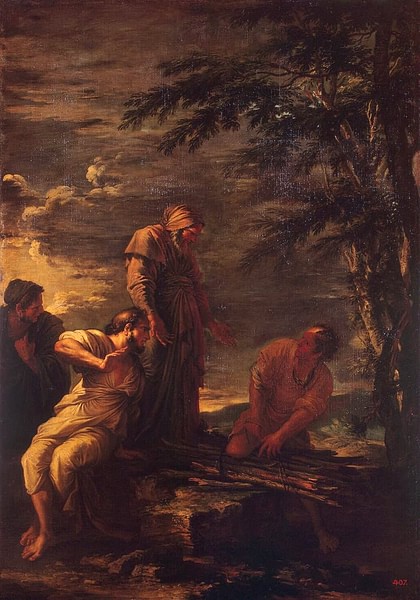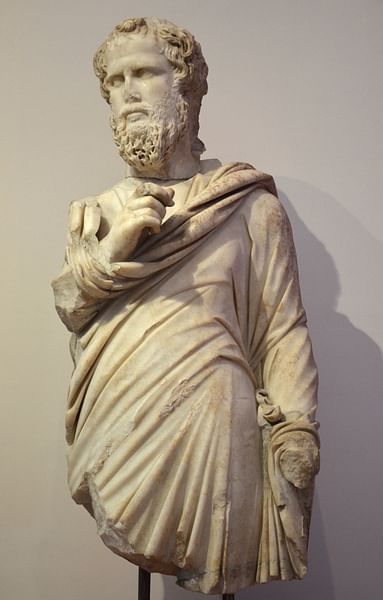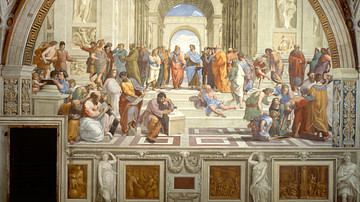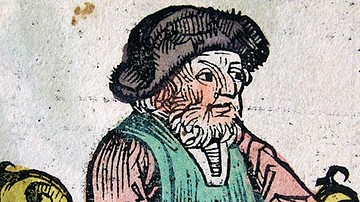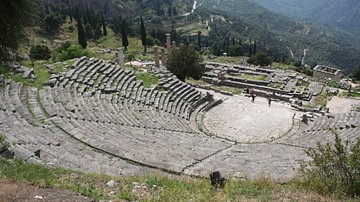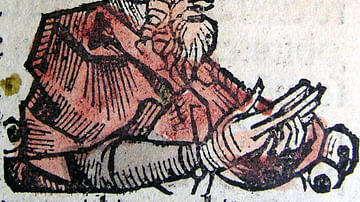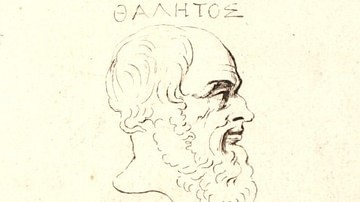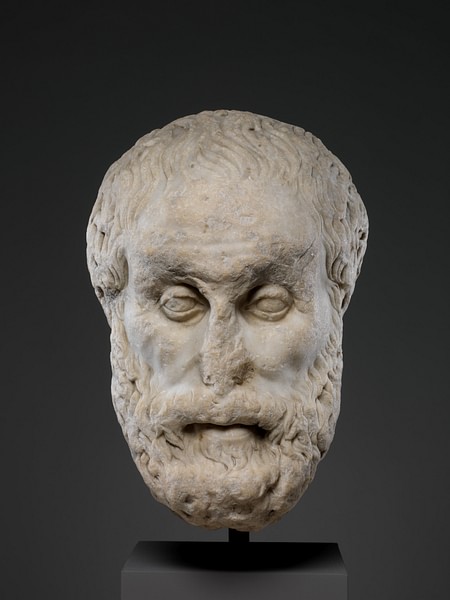
The Pre-Socratic Philosophers are defined as the Greek thinkers who developed independent and original schools of thought from the time of Thales of Miletus (l. c. 585 BCE) to that of Socrates of Athens (470/469-399 BCE). They are known as Pre-Socratics because they pre-date Socrates.
Thales of Miletus initiated the intellectual movement that produced the works now known as ancient Greek philosophy by inquiring into the First Cause of existence, the matter from which all else came, which was also the causative factor in its becoming. He concluded that water was the First Cause because it could assume different forms (steam when heated, ice when frozen) and seemed to inform all living things.
This conclusion was rejected by later philosophers beginning with Anaximander (l. c. 610 - c. 546 BCE) who argued that the First Cause was beyond matter and was, in fact, a cosmic force of creative energy constantly making, destroying, and remaking the observable world. The philosophers who followed these two all established their own schools of thought with their own concepts of a First Cause, steadily building on the accomplishments of predecessors until philosophy found full expression and depth in the works of Plato (l. 424/423-348/347 BCE), who attributed his own ideas to the figure of Socrates.
The philosophy of the Pre-Socratic philosophers is by no means uniform. No two of the men supported exactly the same ideas (except for Parmenides and Zeno of Elea), and most criticized the earlier works of others even as they used them to develop their own concepts. Plato, finally, is critical of almost all of them, but it is apparent from his work that their schools of thought informed and influenced his own, notably the philosophic-religious vision of Pythagoras.
The works of Plato and his student Aristotle (l. 384-322 BCE) would go on to inform the three great monotheistic religions of the present day – Judaism, Christianity, and Islam – as well as Western civilization overall, and these would not have been possible if not for the Pre-Socratic philosophers.
Pre-Socratics & Their Contributions
There are over 90 Pre-Socratic philosophers, all of whom contributed something to world knowledge, but scholar Forrest E. Baird has pared that number down to a more manageable 15 major thinkers whose contributions directly or indirectly influenced Greek culture and the later works of Plato and Aristotle:
- Thales of Miletus – l. c. 585 BCE
- Anaximander – l. c. 610 - c. 546 BCE
- Anaximenes – l. c. 546 BCE
- Pythagoras – l. c. 571 - c. 497 BCE
- Xenophanes of Colophon – l. c. 570 - c. 478 BCE
- Heraclitus of Ephesus – l. c. 500 BCE
- Parmenides – l. c. 485 BCE
- Zeno of Elea – l. c. 465 BCE
- Empedocles – l. c. 484-424 BCE
- Anaxagoras – l. c. 500 - c. 428 BCE
- Democritus – l. c. 460 - c. 370 BCE
- Leucippus – l. c. 5th century BCE
- Protagoras – l. c. 485-415 BCE
- Gorgias – l. c. 427 BCE
- Critias - c. 460-403 BCE
Thales: According to Aristotle, Thales was the first to ask, "What is the basic 'stuff' of the universe?" (Baird, 8) as in, what was the First Cause of existence, from what element or force did everything else proceed? Thales claimed it was water because whatever the First Cause was had to be a part of everything that followed. When water was heated it became air (vapor), when it was cooled it became a solid (ice), added to earth, it became mud and, once dried, it became solid again, under pressure, it could move rocks, while at rest, it provided a habitat for other living things and was essential to human life. It seemed clear to Thales, then, that the underlying element of creation had to be water.
Anaximander: It was not clear to Anaximander, however, who expanded the definition of the First Cause with his higher concept of the apeiron – “the unlimited, boundless, infinite, or indefinite” (Baird, 10) – which was an eternal creative force bringing things into existence according to a natural, set pattern, destroying them and recreating them in new forms. No natural element could be the First Cause, he claimed, because all natural elements must have originated from an earlier source. Once created, he claimed, creatures then evolved to adapt to their environment and so he first suggested the Theory of Evolution over 2,000 years before Darwin.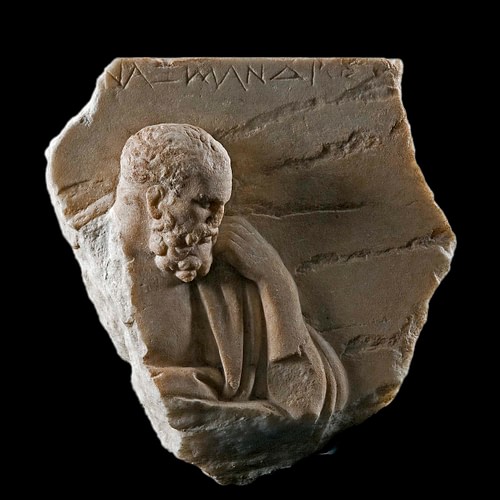
Anaximenes: Anaximenes, thought to be Anaximander's student, claimed air as the First Cause. Baird comments:
Anaximenes proposed air as the basic world principle. While at first his thesis may seem a step backwards from the more comprehensive (like Anaximander's unlimited) to the less comprehensive particular (like Thales' water), Anaximenes added an important point. He explained a process by which the underlying one (air) becomes the observable many: By rarefaction, air becomes fire, and, by condensation, air becomes, successively, wind, water, and earth. Observable qualitative differences (fire, wind, water, earth) are the result of quantitative changes, that is, of how densely packed is the basic principle. This view is still held by scientists. (12)
Anaximenes' definition of “air” and its mutations suggested a First Cause which defined life as a constant state of flux, of change. As air became rarefied or condensed or so on, it changed in form; therefore, change was an important element of the First Cause.
Pythagoras: This concept was developed further by Pythagoras who claimed number – mathematics - as the underlying principle of Truth. In the same way that number has no beginning or ending, neither does creation. The concept of transformation is central to the Pythagorean vision; the human soul, Pythagoras claimed, is immortal, passing through many different incarnations, life after life, as it acquires new knowledge of the world as experienced in different forms. Pythagoras' concepts – including his famous Pythagorean Theorem – were definitely developed from Egyptian ideas, but he reworked these to make them distinctly his own. He wrote nothing down and his teachings were only later committed to writing by Philolaus (l.c. 470-c. 385 BCE) whose works exist only in fragments (as with other authors) so much of his thought has been lost. Based on what is known, however, it is clear his concept of the Transmigration of Souls (reincarnation) greatly influenced Plato's belief regarding immortality.
Xenophanes: The concept of an eternal soul suggested some governing force which created it and to which that soul would one day return after death. Pythagoras included this concept in his teachings which focused on personal salvation through spiritual discipline but does not define what that force is. Xenophanes would later fill in this blank with his concept of a single God. He writes:
There is one god, among gods and men the greatest, not at all like mortals in body or in mind. He sees as a whole, thinks as a whole, and hears as a whole. But without toil, he sets everything in motion by the thought of his mind. (DK 23-25, Freeman, 23)
Xenophanes denied the validity of the anthropomorphic gods of Greece in arguing for a single spiritual entity which had created all things and set them in motion. Once in motion, human beings continued on a course until death at which time, he seems to suggest, their souls reunite with the creative force. Xenophanes' monotheism was not met with any antagonism from the religious authorities of his time because he couched his claims in poetry and alluded to a single god among others, who could have been interpreted as Zeus.
Heraclitus: His younger contemporary, Heraclitus, rejected this view and replaced “God” with “Change”. He is best known for the phrase Panta Rhei (“everything changes” or “life is flux”) and the adage that “one can never step into the same river twice” alluding to the fact that everything, always, is in motion and the water of the river changes moment to moment, as does life. To Heraclitus, existence was brought into being and sustained through a clash of opposites which continually encouraged transformation – day and night, the seasons, etc. – so that everything was always in continual motion and a state of perpetual change. Strife and war, to Heraclitus, were necessary aspects of life in that they embodied the concept of transformative change. To resist this change meant resisting life; accepting change encouraged a peaceful and untroubled life. 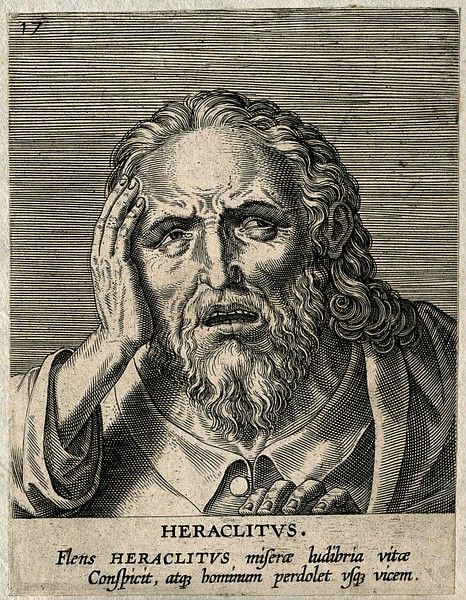
Parmenides: Parmenides rejected this view of life as change in his Eleatic School of thought which taught Monism, the belief that all of observable reality is of one single substance, uncreated, and indestructible. Change is an illusion; appearances change, but not the essence of reality which is shared by every human being. That which one experiences and fears as “change” is illusory because all living things share in the same essential essence. One cannot trust the senses to interpret a reality which suggests change, he said, because the senses are unreliable. One must, instead, recognize that “there is a way which is and a way which is not” (a way of fact and a way of opinion) and recognize the essential Oneness of material existence which does not differentiate: humans grow and develop and die just as animals and plants do. What people see as “differences” between themselves and others are only minor details. His concepts were clarified by Melissus of Samos (l.c. 5th century BCE) who is sometimes referenced as the "third Eleatic" after Parmenides and Zeno.
Zeno of Elea: Parmenides' thought was defended and defined by his pupil Zeno of Elea who created a series of logical paradoxes proving that plurality was an illusion of the senses and reality was uniform. There was actually no such thing as change, Zeno showed, only the illusion of change. He proved this through 40 paradoxes of which only a handful have survived. The most famous of these is known as the Race Course, which stipulates that between Point A and Point Z on a course, one must first run halfway. Between Point A and that halfway mark is another halfway mark and between Point A and that other halfway mark is still another and then another. One can never reach Point Z because one cannot, logically, reach that point without first reaching the halfway mark which one cannot reach because of the many “halfway marks” which precede it. Movement, then, is an illusion and so, therefore, is change because, in order for anything to change, it would have to alter the nature of reality – it would have to remove all “halfway marks” – and this is a logical absurdity. Through this paradox, and his many others, Zeno proved, mathematically, that Parmenides' claims were true.
Empedocles: Empedocles completely rejected the claim that change was an illusion and believed that plurality was the essential nature of existence. All things were differentiated in their own unique way, and by the meeting of opposites, creative energies were released, which led to transformation. Baird writes:
Empedocles sought to reconcile Heraclitus' insistence on the reality of change with the Eleatic claim that generation and destruction are unthinkable. Going back to the Greeks' traditional belief in the four elements, he found a place for Thales' water, Anaximenes' air, and Heraclitus' fire, and he added earth as the fourth. In addition to these four elements, which Aristotle would later call “material causes”, Empedocles postulated two “efficient causes”: strife and love. (31-32)
Strife, to Empedocles, differentiated the things of the world and defined them; love brought them together and joined them. The opposing forces of strife and love, then, worked together toward a unity of design and wholeness, which, Empedocles believed, was what the Eleatic school of Parmenides was trying, but failed, to say.
Anaxagoras: Anaxagoras took this idea of opposites and definition and developed his concept of like-and-not-like and “seeds”. Nothing can come from what it is not like and everything must come from something; this “something” is particles (“seeds”) which constitute the nature of that particular thing. Hair, for example, cannot grow from stone but only from the particles conducive to hair growth. All things proceeded from natural causes, he said, even if those causes are not clear to people. He publicly refuted the concept of the Greek gods and rejected religious explanations, ascribing phenomena to natural causes, and he is the first philosopher to be condemned by a legal body (the court of Athens) for his beliefs. He was saved from execution by the statesman Pericles (l. 495-429 BCE) and lived the rest of his life in exile at Lampsacus. He was the teacher of Archelaus (l.c. 5th century BCE), considered the last of the Pre-Socratic philosophers as he is said to have taught Socrates.
Leucippus and Democritus: His ”seed” theory would influence the development of the concept of the atom by Leucippus and his student Democritus who claimed that the entire universe is made up of “un-cutables” known as atamos. Atoms come together to form the observable world, taking now the form of a chair, now of a tree, now of a human being, but the atoms themselves are of one substance, unchanging, and indestructible; when one form they take is destroyed, they simply assume another. The theory of the atomic universe encouraged Leucippus' philosophy on the supremacy of fate over free will.
Leucippus is best known for the one line which can be authoritatively attributed to him: “Nothing happens at random; everything happens out of reason and by necessity” (Baird, 39). Since the universe is composed of atoms, and atoms are indestructible and continually change form, and human beings are part of this process, the life of an individual is driven by forces outside of one's control – one cannot stop the process of atoms changing form – and so one's fate was preordained and free will was illusory. What one could change through one's will could in no way prevent one's inevitable dissolution.
The Sophists, Socrates, & Plato
As Greek intellectual thought developed, it gave rise to the profession of the Sophist, teachers of rhetoric who taught the sons of the upper class the philosophies of the Pre-Socratics and, through their concepts, the art of persuasion and how to win any argument. Ancient Greece, especially Athens, was highly litigious, and lawsuits were a daily occurrence; knowing how to sway a jury to one's side was considered as valuable a skill at that time as it is today, and Sophists were highly paid.
There were many famous Sophists, such as Thrasymachus (l. c. 459 - c. 400 BCE), best known as Socrates' antagonist in Book I of Plato's Republic and Hippias of Elis (l. 5th century BCE), another contemporary of Socrates and one of the highest-paid Sophists of the time. The three most famous, however, are Protagoras, Gorgias, and Critias whose central arguments would later be developed by other Western philosophers to support the claims of relativism, skepticism, and atheism.
Protagoras: Protagoras of Abdera is best known for the claim which is most commonly given as “man is the measure of all things” meaning that everything is relative to individual interpretation. To one person, who is used to warm climates, a room will feel cold while to another, used to cold climates, it will be warm; neither, according to Protagoras is objectively “right” or objectively “wrong” but are both right according to their experiences and interpretation. Protagoras never denied the existence of the gods but claimed no human being could say anything about them definitively because there was simply no way one could have such knowledge. The existence of the gods and whatever their will might be, like everything else in life, was up to each individual to decide and, whatever they decided, that was the truth for them.
Gorgias: Gorgias claimed that there is no such thing as “knowledge” and that what passed for “knowledge” was only opinion. Actual knowledge was incomprehensible and incommunicable. Gorgias laid out his claim in detail to show that what people called Being could not really exist because anything that “is” must have a beginning and what people called Being had no known First Cause – only people's opinions on what might be a First Cause – and therefore Being could not logically exist. What people perceived as “reality” was neither Being nor Not-Being but simply What-is, but what exactly What-is constituted was unknowable and, if one should know it, could not be communicated to others because they would not be able to understand.
Critias: Critias was related to Plato (his mother's cousin) and an early follower of Socrates. He was one of the Thirty Tyrants who overthrew the Athenian democracy, and the fact he had been Socrates' student is thought to have gone against the latter at his trial for impiety in 399 BCE. Critias is best known for his argument that religion was created by strong and clever men to control others. In a long poem, he describes a time of lawlessness when reasonable men tried to impose order but could not. They decided to create a fiction in which supernatural entities existed who could see into the hearts of men and judge them, sending untold punishments upon those who defied order. In time, this fiction became ritualized as religion but, in reality, there were no such things as gods, no afterlife, and no meaning to religious ritual.
Plato would address the claims of most of the Pre-Socratics, in whole or in part, throughout his works. Pythagoras' thought, especially, had a significant impact on the development of Plato's theory of the immortality of the soul, the afterlife, and memory as recollection from a past life. Protagoras' relativism, the antithesis of Plato's idealism, inspired and encouraged many of his dialogues. It could be argued, in fact, that all of Plato's work is a direct refutation of Protagoras but the concepts of all of the Pre-Socratics inform Plato's work to varying degrees and, in so doing, contributed the underlying foundation for the development of Western philosophy.

